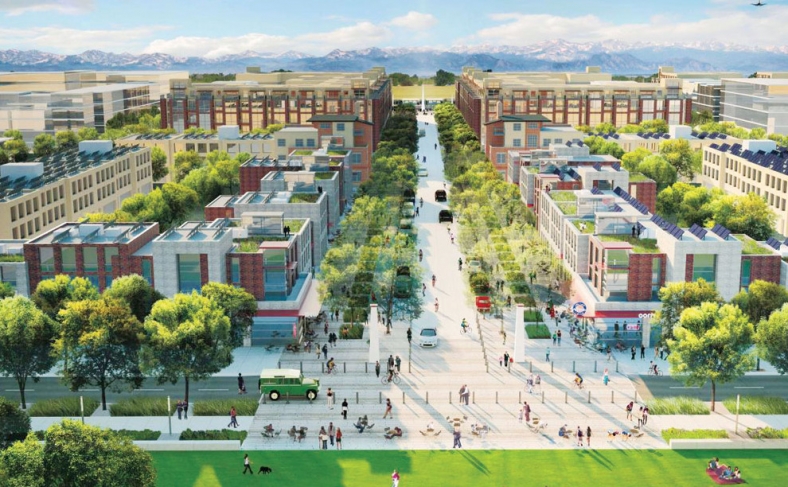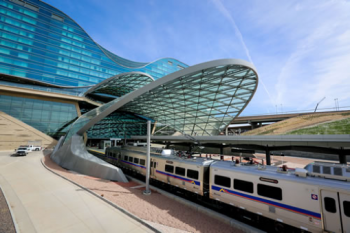Solar-Powered Houses Take Starring Role in Denver’s Community of Tomorrow
Wednesday, October 5, 2016By Linda Silverman
Zero-emission electric vehicles charge along the street. People walk along LED-lighted sidewalks. A commuter train drops travelers off from the airport to enjoy dinner at a corner café. And the houses? They’re entirely powered by sunshine.
This might sound like a scene from the distant future, but it’s not as far away as you think. Exactly one year from today, Solar Decathlon 2017 will kick off in Denver. The biennial competition challenges teams of college students from around the country to design, build and operate beautiful solar-powered houses that are ultra-energy efficient and balance innovation with cost effectiveness. Fourteen Solar Decathlon student teams are now hard at work refining their initial plans for houses designed to provide shelter after disasters, conserve water and achieve other goals.

This artist rendering shows Peña Station Next in Denver, where Solar Decathlon 2017 will take place exactly one year from today. | Image courtesy of City and County of Denver.
The Solar Decathlon houses will join the landscape at Peña Station Next, a burgeoning “smart city” between downtown Denver and the airport that city planners began mapping out several years ago. The plan calls for adding 1.5 million square feet of corporate office space, 500,000 square feet of retail stores, 2,500 solar-powered residential units, and 1,500 hotel rooms to the space separating the vibrant urban hub from the nation’s largest airport in total land area.
The foundation is already taking shape. In April, the publicly operated Regional Transportation District (RTD) opened the University of Colorado A line route, which zips workers, residents and tourists alike between Union Station and Denver International Airport via train at speeds of nearly 80 miles per hour.

The University of Colorado A Line, operated by the Regional Transportation District (RTD) and Denver Transit Partners (DTP), is changing how people experience and access the Mile High City. | Photo courtesy of Denver International Airport.
Panasonic’s innovation arm, Panasonic Enterprises, joined forces with the City of Denver to act as the corporate anchor at the Peña Station Next development. The company aims to take a similar approach as it did with the Sustainable Smart Town project in Fujisawa, Japan, which features solar energy on every rooftop, bike and foot paths, electric vehicle charging stations, wireless internet, and a three-day supply of battery-stored renewable power.
Denver’s concept aligns with the Energy Department’s goal of powering the nation with clean, affordable and diversified energy resources that reduce carbon emissions and protect the environment. We’re proud to partner with the City of Denver as we count down to Solar Decathlon and help shape a brighter, more sustainable future. Go to SolarDecathlon.gov to learn more.
Linda Silverman is director of the U.S. Department of Energy Solar Decathlon.
